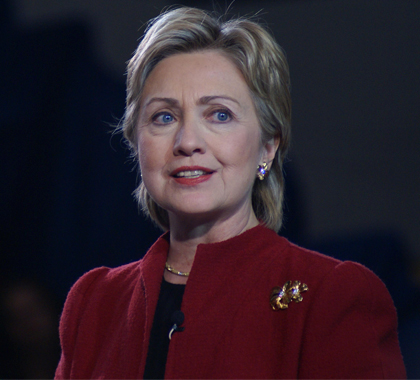An e-mail in WikiLeaks’ Podesta database shows a former State Department official with close ties to Hillary Clinton met with an ambassador to China early in 2016 and attempted to facilitate an “off the record” meeting between Clinton and the ambassador to discuss U.S.-China relations.
The January 2016 e-mail was written by Kurt Campbell, the former assistant secretary of state for East Asian and Pacific affairs (from 2009 to 2013), and sent to John Podesta—a close ally of Hillary Clinton who was serving at the time as a top advisor to President Barack Obama—and a number of high-level Clinton staffers.
The following is the full text of Campbell’s e-mail: “Guys – Chinese Ambassador Cui invited me over to the residence Tuesday for a coffee and to make a request. He wants to have an informal, private, off the record get together with a few of us to discuss the next year and the current state of US-China affairs. He asked me to host a social meal at my house in the next month. He was fairly insistent and indicated that he wanted to pass along some perspectives. I told him I’d reach out to you all to see about your judgement on this and possible availability. I’m happy to make some chili and cornbread by the fire but let’s first decide whether this makes sense. Please let me know your thinking.”
Podesta and Clinton staffer Jake Sullivan both wrote in the e-mail chain they would reach out to Campbell to discuss the meeting. It’s unclear whether Clinton actually had the meeting with Ambassador Cui, but it does appear, at the very least, Campbell had a meeting with the ambassador. This is notable because Campbell was serving as an advisor for the Clinton campaign and had left the State Department in 2014.
The revelation comes as many in the liberal press are attempting to use the 18th-century Logan Act to argue then-President-elect Trump’s staff (or, at least one staff member) engaged in potentially illegal communications with the Russian government in December 2016. According to the media reports, Trump’s former national security advisor, Michael Flynn, had conversations about existing sanctions with Russian officials without permission from the Obama administration.
The broadly written Logan Act forbids any American from negotiating and discussing policy with foreign officials, but it is widely considered unconstitutional and has never once been used to attain a conviction. In fact, only once has a person been prosecuted under the act—a farmer in the early 1800s.
Critics of the Trump administration say even if Flynn’s actions weren’t illegal, they were highly unethical, a claim the Trump administration disputes.
Flynn was asked to resign in February after news outlets reported information had been leaked by intelligence experts proving Flynn had engaged in talks with Russian officials about important state issues. The Trump administration had previously denied Flynn had engaged in the talks and now states Flynn gave a false timeline of events to Vice President Mike Pence, misleading the Trump administration.
If Flynn’s actions were unethical and potentially dangerous, as many on the left are now alleging, then Campbell’s actions (and potentially Clinton’s) were as unethical, and potentially more so. Flynn’s acts occurred just weeks before the Trump administration was set to occupy the White House. It’s clear whatever Flynn said, he did so in anticipation of becoming America’s next national security advisor.
By contrast, Campbell acted about 11 months before the election took place, and if Clinton did meet with the ambassador to discuss foreign policy, she would have done so as a private citizen, not as the president-elect.
Justin Haskins ([email protected]) is executive editor of The Heartland Institute and editor-in-chief of the New Revere Daily Press.
Photo: Hillary Clinton in Hampton, NH. Photo by Marc Nozell.




